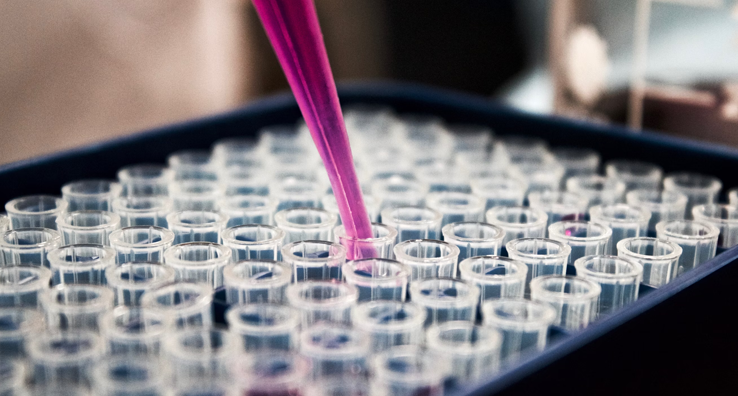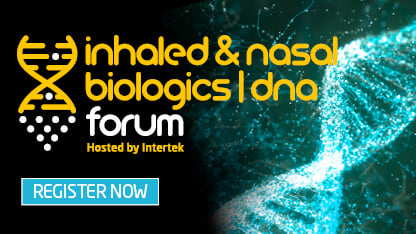Inhaled biologics development incorporating formulation strategies, testing, characterisation, stability, performance/release testing and clinical manufacturing capabilities for orally inhaled or intranasal administration routes
Inhaled biologics offers a highly attractive administration route for various classes of biologic therapeutics, particularly for the treatment of respiratory diseases. Due to their size and polarity, biologic drugs face limited permeability across the intestinal epithelium. Furthermore, enzymatic degradation renders them ineffective when taken orally. Consequently, biologics are typically administered via injections which can be uncomfortable for patients, often resulting in poor patient compliance.
Inhaled or nasal routes of administration present attractive options due to the lung's large surface area, rich vascularization, and high tissue permeability, facilitating rapid absorption and onset of action alongside lower potenial for proteolytic enzyme activity and minimal first-pass metabolism. The potential for new therapeutic pathways for diseases such as cystic fibrosis, asthma and lung cancer, coupled with the advantages presented by targeted delivery to the lung (and systemic delivery for other diseases or treatment pathways), are driving increased attention across the pharmaceutical industry.
The complexity of biologics and the difficulty of delivering a drug to the lungs and the nose means that inhaled and nasal biologic drug development is particularly challenging. In regulatory terms, these products will require characterisation of the biologic as per ICH Q6B, as well as specific OINDP testing to assess delivered dose uniformity from the device and the particle size of the drug emitted as outlined in documents such as the EMA guideline on the pharmaceutical quality of inhalation and nasal products (June 2006) or the US FDA metered dose inhaler (MDI) and dry powder inhaler (DPI) products quality considerations guidance.
Biologic drugs have complex structures including higher order structures fundamental to their function, safety and efficacy and are susceptible to a wide range of degradation routes such as aggregation, fragmentation, deamidation, hydrolysis, oxidation, deglycosylation and disulphide bond formation/ breakage. Sophisticated formulation development and device selection are key to avoiding these pathways and developing a stable, efficacious product. In parallel, a wide suite of robust biologics characterisation tools is essential.
Intertek has over 30 years’ experience in biologics characterisation, from small peptides up to monoclonal antibodies and conjugated species, and contract testing, formulation and clinical manufacturing services supporting orally inhaled and nasal drug product development. The Intertek Centre of Excellence for Inhaled Biologics deploys a strategic programme of orthogonal analytical methods which aim to both fully characterise the biological entity and establish whether the device delivery mechanism (e.g. actuation through an inhaler) has adversely affected parameters. This includes the requirements of the ICH Q6B Guidance such as potency, protein structure characterisation and confirmation, total protein quantity, key physicochemical properties, post-translational modifications (PTM), higher order structure, assessment of aggregation, product-related impurities and process-related residuals.
With integrated formulation and stability teams, we use stability data to drive insight into the impact of the formulation and the device on the biologic including developing and validating stability-indicating methods and forced degradation studies. We have experience across nasal solutions / suspensions, nebulised solutions / suspensions and dry powders, offering a Center of Excellence to support you with formulation development, product performance testing, method development/validation, stability, CMC support and clinical manufacturing capabilities.
We have over 30 years of experience in supporting clients’ orally inhaled & nasal drug product development, from early-stage development, through to in-process control and product release assays. With a heritage of supporting advanced pharmaceutical product development and formulation, coupled with a comprehensive range of analytical technology, our experts offer Total Quality Assurance expertise to help you ensure the safety, efficacy and quality of your inhaled or nasal biologic product.
ON DEMAND WEBINARS
Repurposing Products for Inhaled Delivery - Rapid Response Strategies
Formulation and Manufacturing Approaches for Nasal Drug Products
ARTICLE DOWNLOADS
Repurposing Vaccines for Intranasal Development
In Vitro Bioequivalence for Pulmonary and Nasal Delivery
Nebulised Drug Development Considerations
Assessment of Foreign Particulate Matter in DPI Formulations
Pharmaceutical News & Events
- PRESS RELEASE! Intertek partners with CrystecPharma to advance formulation science and accelerate development for dry powder inhalers
- NEW! Blog: Optimising Quality in Pharma Supply Chains
- Determination of Particles in Pharmaceuticals - Article
- Discover our Audit Live Tool for direct access to our scheduled audits
- Extractables/Leachables Lab Tour - Request access
- Medical Device Extractables & Leachables Studies
- Glycosylation Analytical Approaches for Antibody Therapeutics
- Rapid Determination of Low/Trace Level Benzene in Pharmaceutical Excipients and Finished Products

COVID-19 VACCINE OR THERAPEUTIC TESTING & DEVELOPMENT SUPPORT
IMMEDIATE QUESTION? Ask our experts now
FACTSHEET: COVID-19 Vaccine or Therapeutic Testing & Development Outsourcing
ARTICLE: Repurposing Vaccines for Intranasal Development
WEBINAR: Quality Control Strategy for Vaccine Development
WEBINAR: Repurposing Drugs for Inhaled Delivery
eBOOK: Contingency Outsourcing Solutions


